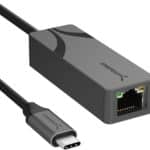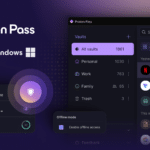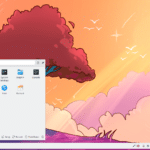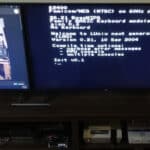Sabrent launches NT-25GA USB-C to 2.5 Gigabit Ethernet (2.5GbE) adapter for Windows, macOS and Linux

Today, Sabrent has launched its latest product -- the USB-C to 2.5 Gigabit Ethernet (2.5GbE) adapter (NT-25GA). This compact device is designed to provide a quick and easy way to add a high-speed Ethernet port to any USB-equipped system.
The Sabrent NT-25GA adapter supports impressive speeds of up to 2.5Gbps, making it ideal for handling large data transfers over distances of at least 100 meters using Cat5e or better cabling. It is fully backward compatible and comes with a range of standard features including Wake-On-LAN (WOL), UEFI PXE boot support for compatible systems, and more. For optimal performance, it is recommended to use the adapter with a USB 3.2 Gen 1x1 (5Gbps) port or faster.
Linus Torvalds announces Linux 6.8

In a recent announcement, Linus Torvalds revealed the release of Linux 6.8. The latest version of the kernel took a bit longer to finalize due to a higher-than-preferred commit count, primarily attributed to updates in various self-tests, particularly in networking. However, the past two weeks have seen a calming of activities, allowing for the release to proceed without further delay.
Linux 6.8 does not boast the same level of groundbreaking changes as its predecessor but maintains a consistent pace with an average release size, reminiscent of the past few years. The most notable addition in this version is the new Xe DRM driver, although the bulk of the changes are scattered updates and fixes across the board.
Get 'Linux DevOps Handbook' (worth $39.99) for FREE

The Linux DevOps Handbook is a comprehensive resource that caters to both novice and experienced professionals, ensuring a strong foundation in Linux.
This book will help you understand how Linux serves as a cornerstone of DevOps, offering the flexibility, stability, and scalability essential for modern software development and operations. You’ll begin by covering Linux distributions, intermediate Linux concepts, and shell scripting to get to grips with automating tasks and streamlining workflows.
Zorin OS 17.1 Linux distribution gets enhanced Windows app support -- you can now escape Microsoft’s stranglehold

The Zorin OS 17.1 Linux distribution is now available, offering a range of improvements designed to enhance the computing experience for users transitioning from proprietary platforms like Windows and macOS. With over half a million downloads of Zorin OS 17 since its release, it's clear that the mission to introduce the power of Linux to new users is resonating.
The latest version, Zorin OS 17.1, introduces enhanced Windows app support, making it easier for users to run their favorite applications, regardless of the original platform. The built-in database now detects installer files for over 100 popular Windows apps and games, offering tailored recommendations for native Linux alternatives. This ensures a smoother transition and a more compatible experience for users.
Microsoft has started referring to its CBL-Mariner distro as Azure Linux

While it came as a bit of a surprise when it first became public, it has been known for some time that Microsoft has its own Linux distro called CBL-Mariner. The name has been questioned by many, and it is in the process of changing.
The CBL-Mariner moniker is set to become a thing of the past as the distro transitions to being known as Azure Linux.
Linux users beware: New Bifrost malware variant poses imminent threat

Security researchers at Palo Alto Networks have uncovered a new variant of the notorious Bifrost malware, now targeting Linux systems with a cunning twist. This latest iteration employs a deceptive domain, download.vmfare[.]com, to masquerade as a legitimate VMware site, thereby bypassing security measures and compromising unsuspecting users.
Bifrost, a remote access Trojan (RAT) first identified in 2004, has been a persistent threat, enabling attackers to pilfer sensitive information such as hostnames and IP addresses. The recent surge in Linux variants of Bifrost has sent ripples of concern through the cybersecurity community, signaling a potential uptick in attacks on Linux-based systems.
Proton Pass password manager app for Windows launches with offline mode -- macOS and Linux versions on the way

Proton, the privacy and security company, has launched Proton Pass for Windows -- a new standalone desktop application that extends its secure password management beyond the web browser. Proton Pass offers an enhanced user experience by integrating more seamlessly with the Windows operating system, allowing smoother management of passwords and encrypted login information.
One of the key features of this new application is its offline mode, available to Proton Pass Plus and Unlimited users. This mode ensures access to information anytime, without needing an Internet connection, and is secured with Argon2 encryption, known for its robust defense against brute-force attacks.
KDE Plasma 6: Revolutionizing Linux desktop with far prettier and superior interface than Microsoft Windows 11

The KDE community has announced the release of its latest “MegaRelease 6,” which includes Plasma 6, Frameworks 6, and Gear 24.02. This update brings a host of new features, improvements, and enhancements to the KDE ecosystem. With its sleek and modern design, Plasma 6 not only surpasses the user interface of Microsoft Windows 11 but also elevates the overall computing experience.
The Plasma 6 desktop environment has undergone significant upgrades with a transition to the latest version of the Qt application framework and a migration to the Wayland graphics platform. These changes aim to improve security, efficiency, and performance while ensuring a smooth and familiar user experience. Plasma 6 also introduces a new Overview Effect, combining the Overview and Desktop Grid effects, and adds partial support for High Dynamic Range (HDR) on Wayland. Users can now enjoy richer colors, individual ICC profile settings, and color blindness correction filters.
Tails 6.0 Linux distribution: The ultimate privacy shield to thwart 'Big Brother'

Tails 6.0, the newest version of the privacy-focused Linux distribution, is now available for download. It is notable for being the first version of Tails to be based on Debian 12 (Bookworm) and use the GNOME 43 desktop environment. This update also introduces a host of new features, security enhancements, and usability improvements, alongside updated versions of the majority of the software included in Tails.
In Tails 6.0, users will find a new error detection feature for the Persistent Storage, which alerts them about errors when reading or writing from the Tails USB stick. This helps in diagnosing hardware failures and prompts users to backup their Persistent Storage before it's too late. The update also brings automatic mounting of external devices. When an external storage device is plugged in, Tails 6.0 mounts it automatically, and if the device contains an encrypted partition, it offers to unlock the encryption automatically.
Breathe new life into aging PCs: Tiny Core Linux 15.0 challenges Windows 11

Tiny Core Linux 15.0 has been officially released. This latest version of the minimalist operating system challenges the dominance of Windows 11 by offering a lightweight, efficient alternative that can breathe new life into older hardware.
The changelog for Core v15.0 reveals several key updates. You can see a list of notable changes below.
KDE Slimbook V Linux laptop challenges Microsoft’s Windows 11 dominance

In a world dominated by Windows laptops, the KDE Slimbook V emerges as a compelling alternative, blending cutting-edge hardware with the freedom of open-source software. This collaboration between Slimbook and KDE brings to the table a Linux machine that's not just about performance but also about user choice and privacy.
At the heart of the KDE Slimbook V lies an AMD 7840HS CPU, boasting 8 cores and 16 threads, ready to tackle everything from office tasks to code compilation. Paired with the impressive AMD 780M GPU, equipped with 12 cores and RDNA 3, this laptop promises smooth gaming and 3D rendering experiences, challenging the notion that Linux laptops can't keep up with their Windows counterparts in terms of graphics performance.
Can Linux run on Nintendo’s ancient NES game console? Someone decided to try

Inspired by the age-old question, "Can it run Linux?", an intrepid YouTuber called DeCrAzYo successfully managed to get a "Unix-like" operating system up and running on that classic 1980s Nintendo games console, the NES. There was no cheating involved either. He didn't take any shortcuts by modifying the console's internal components or by sneaking a Raspberry Pi into the mix.
His goal was to have the operating system's code executed directly via the NES processor using no more hardware than a typical game cartridge would offer, and that's exactly what he managed.
Damn Small Linux 2024 returns to breathe new life into old computers -- a feat Microsoft's bloated Windows 11 can't achieve

Damn Small Linux (DSL), a name that should resonate with many veteran tech enthusiasts, has made a triumphant return after a 12-year absence (albeit as a pre-release Alpha) in 2024 with a fresh iteration designed for low-spec 32-bit x86 computers. DSL 2024 is a compact Linux-based operating system that packs a punch with a bunch of useful applications, all while maintaining a small footprint.
The new DSL 2024 is not just about nostalgia; it's a practical solution for older computers, keeping them functional and out of landfills. The distribution is tailored to fit on a single CD, with a hard limit of 700MB, a significant jump from its 50MB predecessor but still a marvel in today's gigabyte-centric world. This constraint has led to a meticulous selection of applications that are functional, lightweight, and have low dependencies.
Authy desktop apps for Windows, macOS, and Linux reach end-of-life: Here's what you need to know

There is some shocking and sad news that will impact Authy users globally. You see, Twilio has announced the end-of-life for its desktop applications on Windows, macOS, and Linux platforms, slated for March 19, 2024. This move highlights a change in the company's strategy, emphasizing the transition towards mobile-centric security solutions.
Authy has been a staple for users seeking an extra layer of security beyond traditional passwords. The desktop applications have provided a convenient way for users to manage their authentication tokens directly from their computers. However, with the upcoming discontinuation, Authy is urging its user base to migrate to its mobile applications.
SparkyLinux 2024.02 gets many significant improvements, including enhanced file system support

SparkyLinux has just released its latest update to the semi-rolling ISO images derived from the Debian testing line. The update addresses a variety of features and issues, including the resolution of the CLI Installer problem related to the btrfs and xfs file systems. Notably, there is an update to the Sparky Tray to provide quick access to essential system tools, improving the overall user experience.
The 2024.02 update offers a comprehensive upgrade of all packages from the Debian and Sparky testing repositories, ensuring that the software is up to the minute. It also introduces a range of kernel updates, with Linux kernel version 6.6.13 being the primary version, while also making available versions 6.7.4, 6.6.16-LTS, 6.1.77-LTS, and 5.15.148-LTS within Sparky repositories for users seeking different levels of stability and support.
Recent Headlines
© 1998-2024 BetaNews, Inc. All Rights Reserved. Privacy Policy - Cookie Policy.